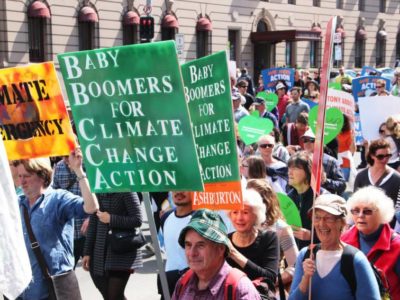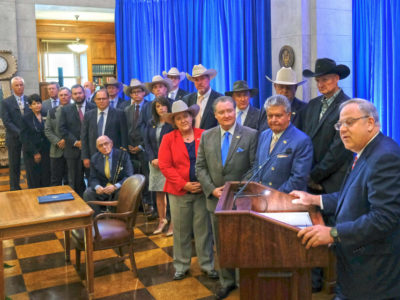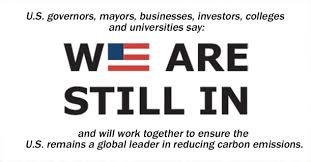A Letter to My Fellow Boomers About Climate Change
We have met the enemy and he is us.
Polls show that a great many members of our generation oppose taking action against climate change. I want to try to explain to that group why you should rethink your views. Let me start by explaining why climate action would benefit you yourself and then widen the focus to include your grandchildren and their kids. Efforts to cut climate change right now aren’t likely to have a big effect on climate in the next decade or two. But there are more immediate bene...
CONTINUE READINGTrump Administration Attempts to Eviscerate the Endangered Species Act
Rather Than "Improve" ESA, Newly-Adopted Regulations Dramatically Erode Its Historic Protections
The Endangered Species Act, enacted in 1973, has for most of its history been the most controversial and politically-charged of all the foundational environmental laws adopted by Congress in the 1970's. But despite its contentious history, opponents of the ESA have been unsuccessful in their efforts to weaken the law, either through significant Congressional amendments or regulatory changes. Until now. Both on the 2016 campaign trail and after his inauguratio...
CONTINUE READINGThe LA County Sustainability Plan
An innovative approach to ambitious goals
Last week, the Los Angeles County Board of Supervisors unanimously approved the LA Countywide Sustainability Plan. Along with my colleagues Sean Hecht and Nat Logar and other faculty across UCLA, I assisted in the drafting process and witnessed the shaping of the Plan from the ground up. The final Plan provides a best practices model for other counties and regional governments to look to for guidance on designing sustainability plans focused on people’s livelihoods, im...
CONTINUE READINGElections Matter – Even More Than You Thought.
Three ultra-close elections put us a dozen years behind in climate policy.
I don’t know about you, but I’m finding it hard to keep focused on November 3, 2020, given the confusing welter of candidates on one side and the daily bombshells issuing from the other. So maybe this is a good time for a reminder of a why elections matter. In fact, they not only matter, but their repercussions can last decades past any individual presidency. Three elections in this century, each decided by close margins in a handful of states, froze progress ...
CONTINUE READINGRisky Business
Risky Business
Last week, the Institute for Energy Economics and Financial Analysis issued a report criticizing BlackRock, the world’s largest fund, for making bad bets on the fossil fuel industry that cost the firm billions of dollars. What I found significant was less the plight of Blackstone’s shareholders than the fact that the energy firms weren’t doing very well. One category consisted of firms that, like GE, had made big investments in producing gas turbines. Those firms...
CONTINUE READINGGet Ready for Phase 2 of the Deregulation Wars
Air quality standards are next on the chopping block.
The first phase of Trump’s regulatory rollbacks has been directed against Obama’s climate change regulations. Those deregulatory actions will be finalized soon. What happens next will be in the hands of the courts. But the Trump EPA is now beginning a new phase in its attack on environmental regulation. Having tried to eliminate climate rregulation, its next move will be an attack on basic protections against air pollution. The Clean Air Act, the federal air...
CONTINUE READINGPerfection – Public Enemy Number One, or Straw Man?
We don't let the perfect be the enemy of the good. Is that always a good thing?
“Don’t let the perfect be the enemy of the good.” How many times do you think you have heard that phrase? Many people attribute the concept to Voltaire, so as advice goes, how bad could it be? It’s darn good advice in many situations – such as selecting a checkout line to stand in at the grocery store, choosing which pair of socks to wear, or deciding whether to play a cut from Sgt. Pepper’s over one from Rubber Soul. But in the world of public policy, adheri...
CONTINUE READINGThe Expanding Gap Between Business and Trump
Big business was happily married to the GOP. But there’s trouble in paradise.
The GOP used to be synonymous with big business. But there seem to be growing divisions – divisions that may open the way to new environmental initiatives. In April, the Washington Post ran a story about the U.S. Chamber of Commerce’s decision to loosen its ties to the GOP and move toward a more bipartisan stance. The move was partly motivated by the growing distance between the business community and the Trump-era GOP on issues like immigration and internatio...
CONTINUE READINGThe Flight of the Bumblebee
The Trump Administration loses an environmental case. Again.
Last Friday, the Fourth Circuit halted efforts to build a natural gas pipeline because the Administration had done such a lousy job of showing its compliance with the Endangered Species Act. This was one of the Administration's many losses in court. The case involved a perfect example of “arbitrary and capricious” decision making, to use the legal terminology. In simpler terms, the government’s explanation for its decision was as full of holes as a sieve. This wa...
CONTINUE READINGRenewable Texas: Lessons from the Lonestar State
Texas has the most wind power in the country and is rapidly building solar. How did that happen?
People are often surprised to learn that Texas is the national leader in wind power, with the twice the generating capacity of any other state. On one notable night in December of 2015, the state got 45% of its power from wind, though the year-round average was only about 10%. In July of this year, the state's grid operator reported that more power was generated by wind than coal in the first six months of 2019. In 2016, ERCOT, which operates nearly all of the ...
CONTINUE READING











